Related Research Articles

Thomas Hart Benton, nicknamed "Old Bullion", was a United States Senator from Missouri. A member of the Democratic Party, he was an architect and champion of westward expansion by the United States, a cause that became known as Manifest Destiny. Benton served in the Senate from 1821 to 1851, becoming the first member of that body to serve five terms.

Samuel Baldwin Marks Young was a United States Army general. He also served as the first president of Army War College between 1902 and 1903. He then served from 1903 until 1904 as the first Chief of Staff of the United States Army.

Louisburg College is a private Methodist-affiliated two-year college in Louisburg, North Carolina.

Ellis Spear was an officer in the 20th Maine Volunteer Infantry Regiment of the Union Army during the American Civil War. On April 10, 1866, the United States Senate confirmed President Andrew Johnson's February 24, 1866 nomination of Spear for appointment to the grade of brevet brigadier general to rank from April 9, 1865. He was United States Commissioner of Patents in 1877-1878.

Thomas Mead Bowen was a state legislator in Iowa and Colorado, a Union Army officer during the American Civil War, a justice of the Arkansas Supreme Court, briefly the Governor of Idaho Territory, an elected judge in Colorado and a United States Senator from Colorado.
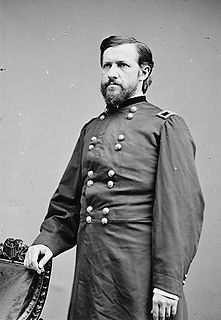
Thomas Ewing Jr. was an attorney, the first chief justice of Kansas and leading free state advocate, Union Army general during the American Civil War, and two-term United States Congressman from Ohio, 1877–1881. He narrowly lost the 1880 campaign for Ohio Governor.

Lewis Woodson was an educator, minister, writer, and abolitionist. He was an early leader in the African Methodist Episcopal Church (AME) in Ohio and Pennsylvania. Woodson started and helped to build other institutions within the free African-American communities in Ohio and western Pennsylvania prior to the American Civil War.
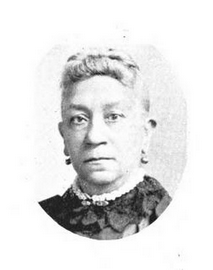
Sarah Jane Woodson Early, born Sarah Jane Woodson, was an American educator, black nationalist, temperance activist and author. A graduate of Oberlin College, where she majored in classics, she was hired at Wilberforce University in 1858 as the first black woman college instructor and she was the first black American to teach at a historically black college or university (HBCU).
John Breckenridge Ellis was an American writer of the late 19th and early 20th century.

Ellison Capers was a Confederate general in the American Civil War, theologian, college Professor and administrator from South Carolina.

Henry Dana Washburn was a U.S. Representative from Indiana and a colonel and brevet brigadier general in the Union Army during the American Civil War.

Adoniram Judson Warner was a U.S. Representative from Ohio and an officer in the Union Army during the American Civil War.
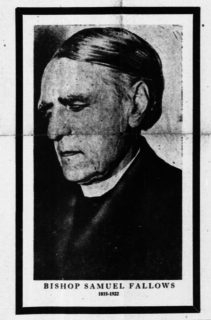
Samuel Fallows was an English American immigrant, minister, lecturer, and author. He was the 9th Superintendent of Public Instruction of Wisconsin and served as Presiding Bishop of the Reformed Episcopal Church for 30 years between 1877 and 1922. During the American Civil War he served as a chaplain and later as an officer in the Union Army, receiving an honorary brevet to Brigadier General after the war.

William Yarnel Slack was a Missouri lawyer, politician, and general in the Missouri State Guard during the American Civil War. He led a division in some of war's earliest major battles in the Trans-Mississippi Theater and was mortally wounded in the Battle of Pea Ridge in Arkansas.
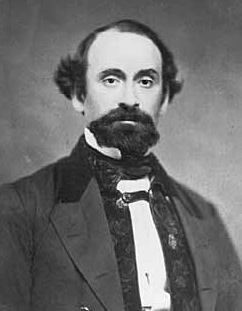
John Benjamin Sanborn was a lawyer, politician, and soldier from the state of New Hampshire who served as a general in the Union Army during the American Civil War. He was also a key member of the postbellum Congressional-appointed Indian Peace Commission, which negotiated and signed several important treaties with native American tribes.

Lewis Baldwin Parsons Jr. was one of the last officers who was promoted to brigadier general of volunteers in the Union Army during the American Civil War.
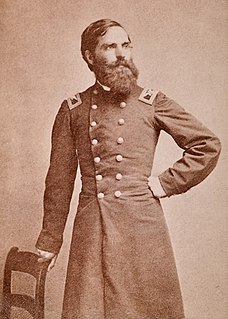
Samuel Woodson Price was a portraitist, author and Union Army officer in the American Civil War.
Levin Major Lewis was a Confederate States Army colonel during the American Civil War. On May 16, 1865, he was assigned to duty as a brigadier general by General E. Kirby Smith when the war even in the Trans-Mississippi Department was almost over, but he was not officially appointed by Confederate President Jefferson Davis and confirmed by the Confederate Senate to that grade.
Wesleyan Female College of Wilmington, Delaware was a college for women located in the United States that operated from 1837 to 1885.
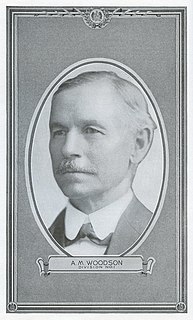
Archelaus Marius Woodson was a Justice of the Supreme Court of Missouri from 1907 to 1925.
References
- 1 2 3 4 5 6 7 8 9 10 11 12 13 14 15 16 Carrie Polk Johnston and William Harvey Sheridan McGlumphy, History of Clinton and Caldwell Counties, Missouri (1923), p. 130-31.
- ↑ Allardice, Bruce S. More Generals in Gray. Baton Rouge: Louisiana State University Press, 1995. ISBN 978-0-8071-3148-0 (pbk.). pp. 142–143.
- ↑ Eicher, John H., and David J. Eicher, Civil War High Commands. Stanford: Stanford University Press, 2001. ISBN 978-0-8047-3641-1. p. 603.
- 1 2 3 4 5 "Dr. John W. Ellis Dies In Arkansas", St. Joseph News-Press (December 1, 1910), p. 2.
- ↑ A.J.D. Stewart, The History of the Bench and Bar of Missouri (1898), p. 660-61.
- ↑ "Judge Woodson Dies In Kansas City", The Neosho Times (November 19, 1925), p. 1.